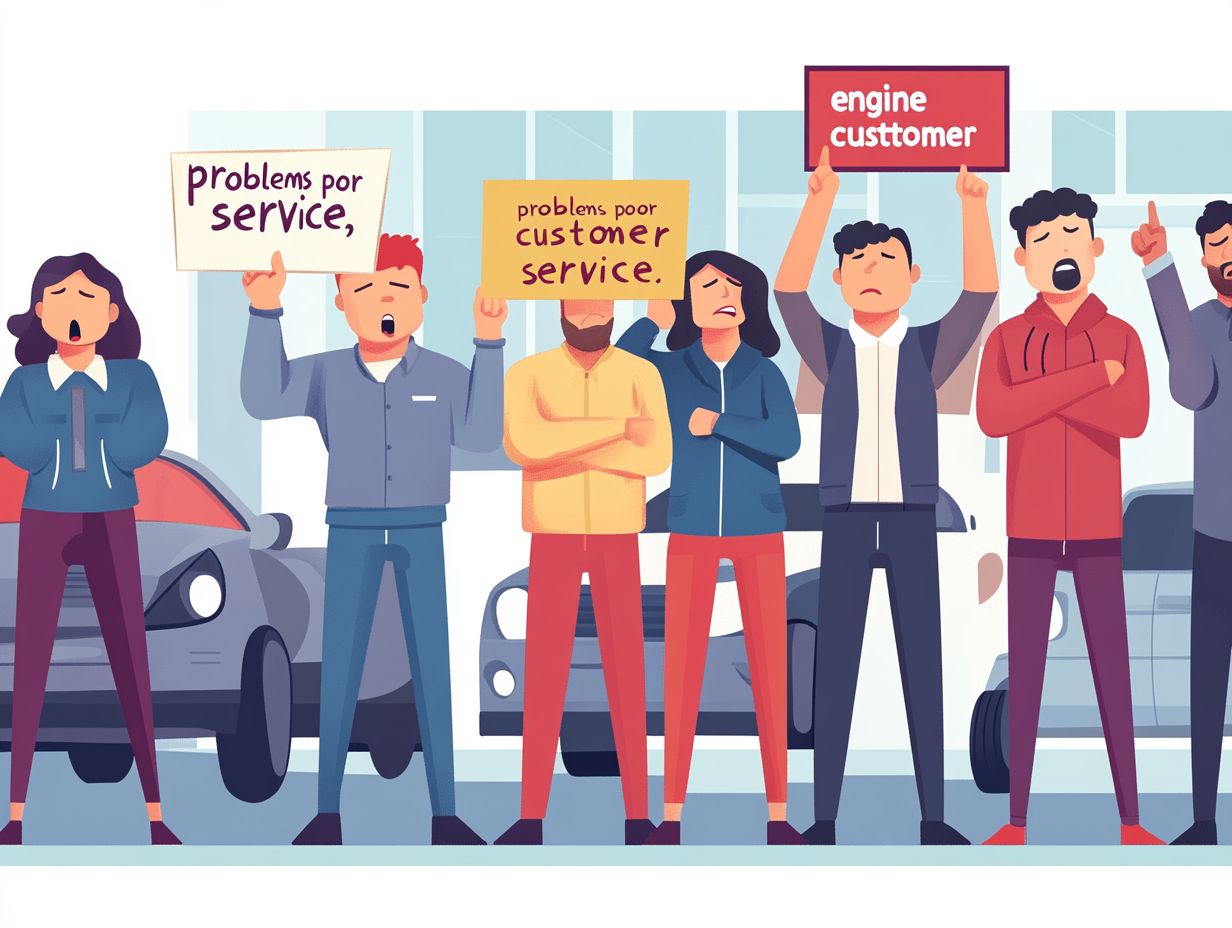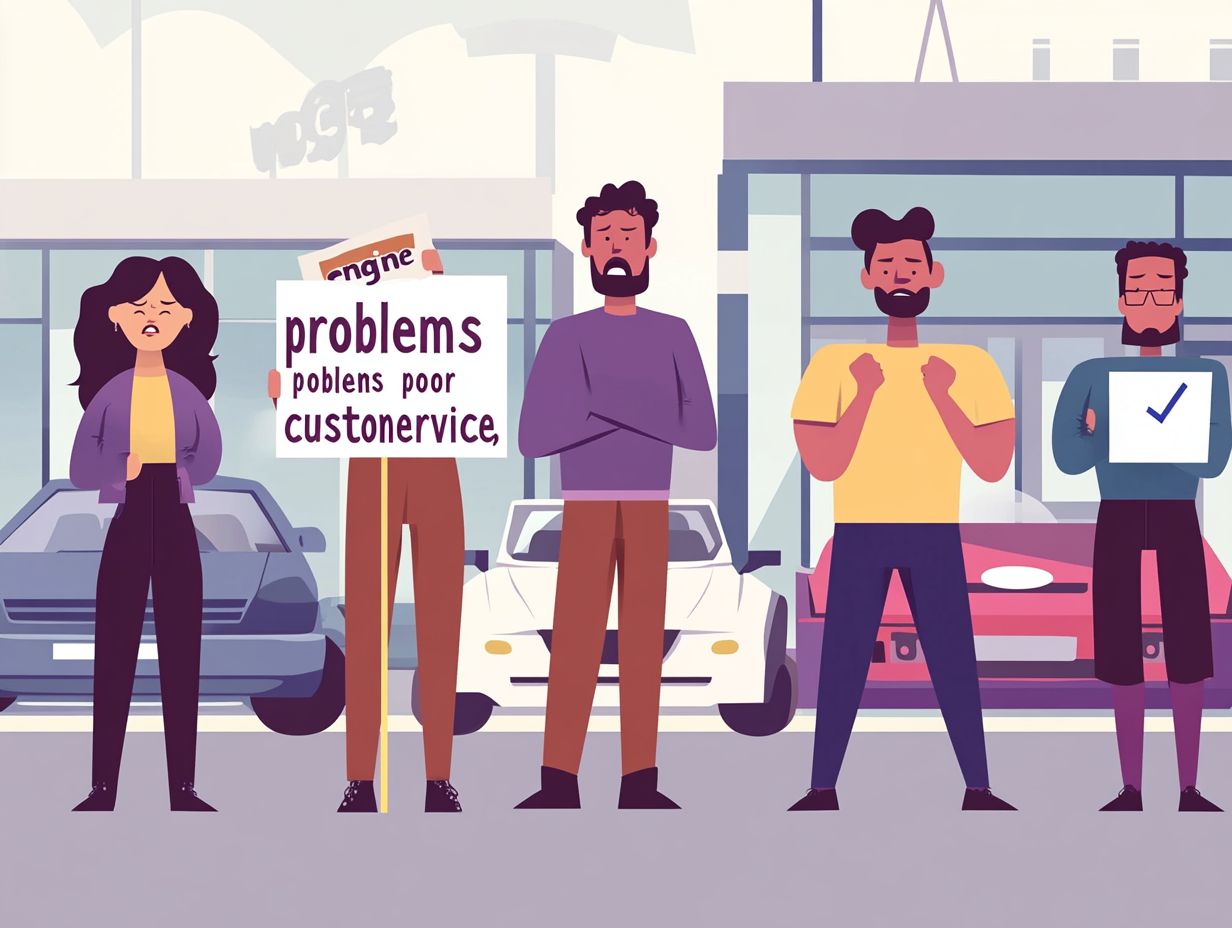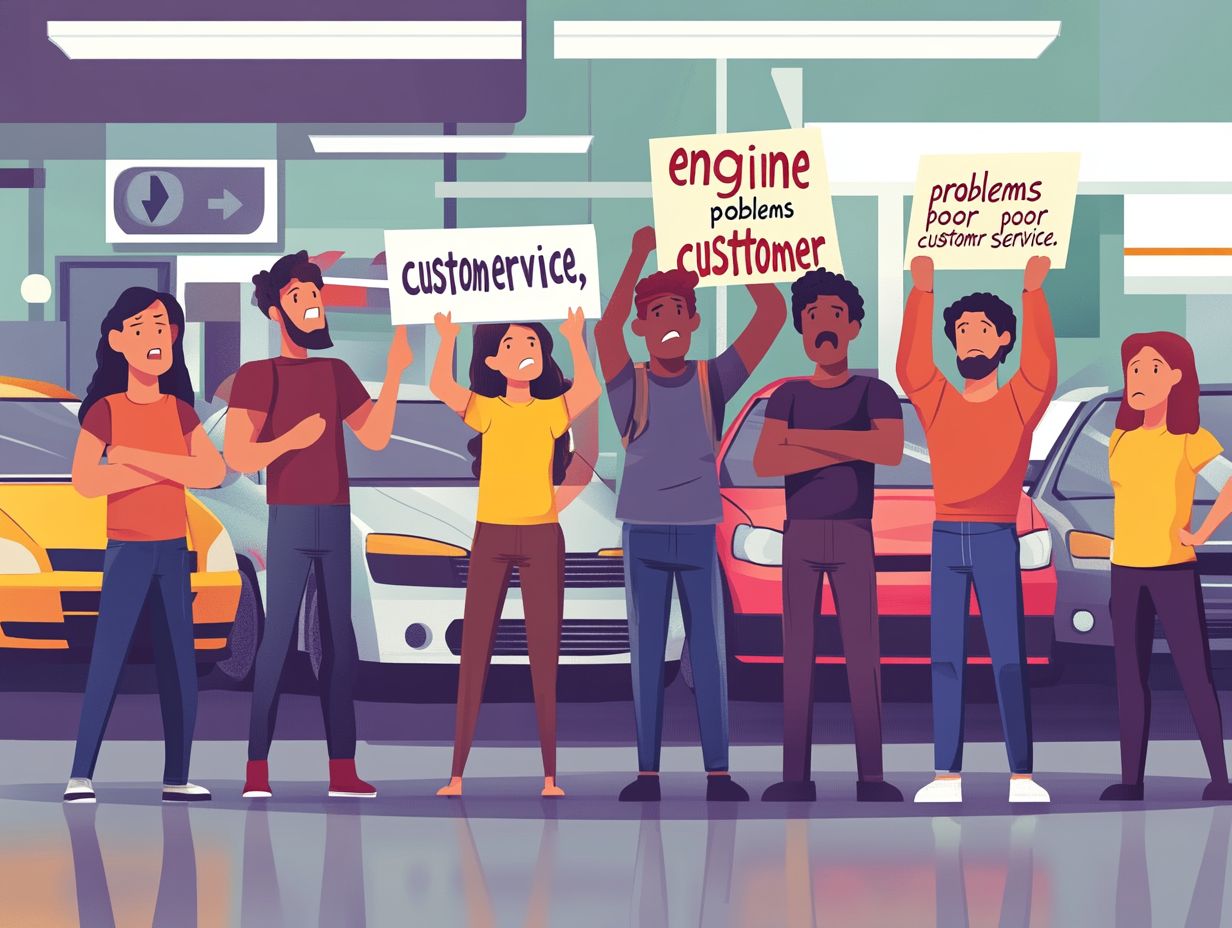Common User Complaints About Car Brands
Choosing a car can be an exhilarating journey. However, that excitement can swiftly turn into frustration if you find yourself with a vehicle that falls short of your expectations.
Countless drivers have faced disappointments, dealing with everything from poor fuel efficiency to uncomfortable rides. Let’s explore common complaints drivers have about various car brands.
Whether it’s mechanical issues, safety concerns, or a glaring absence of modern features, being aware of these pitfalls will empower you to make a more informed decision for your next vehicle.
Discover what to keep an eye on to avoid these headaches and enjoy your ride!
Contents
- Key Takeaways:
- 1. Poor Fuel Efficiency
- 2. Frequent Mechanical Issues
- 3. Lack of Comfort and Convenience Features
- 4. Unreliable Performance
- 5. Expensive Maintenance and Repairs
- 6. Limited Safety Features
- 7. Inadequate Interior Space
- 8. Difficult to Maneuver or Park
- 9. Lack of Technology Integration
- 10. Poor Resale Value
- 11. Uncomfortable Seats
- 12. Noisy or Uncomfortable Ride
- 13. Inconvenient or Non-Intuitive Controls
- 14. Lack of Style or Design Appeal
- 15. Poor Customer Service Experience
- Frequently Asked Questions
- What are common user complaints about car brands?
- Which car brands have the most user complaints?
- What are some specific complaints about Jeep?
- Why do some car brands have more user complaints than others?
- Are there any car brands that consistently have fewer user complaints?
- What can I do if I have a complaint about my car brand?
Key Takeaways:

- Poor fuel efficiency is a common complaint among car users, leading to increased expenses and environmental concerns.
- Frequent mechanical issues can be frustrating and costly for car owners, causing disruptions in daily life.
- A lack of comfort and convenience features can make long drives uncomfortable and inconvenient for car users.
1. Poor Fuel Efficiency
Poor fuel efficiency can be a major thorn in your side. It affects not just your wallet but also leaves a larger environmental footprint.
When you notice your vehicle using more fuel than expected, it can diminish your overall satisfaction. Rising fuel costs may make you hesitant to address other essential maintenance issues, compounding the problem.
Modern vehicles have advanced features like energy-efficient systems and real-time tracking designed to help with fuel consumption. These technologies enhance your driving experience and provide insights into emissions data collection. However, they can also raise privacy concerns, as the collection and usage of data might feel like unwanted surveillance. This awareness may lead you to approach your vehicle choices with greater caution.
2. Frequent Mechanical Issues
Frequent mechanical issues pose a significant challenge for car brands. This leads to consumer dissatisfaction and raises serious concerns about the reliability of these vehicles.
Some manufacturers have faced scrutiny due to numerous reports of engine failures. This can understandably lead you to question the integrity of your purchase. Such situations complicate consumer protection principles, as inadequate responses from brands can leave you feeling unsupported and vulnerable.
Ensuring transparency in warranty policies is crucial for you. It clarifies your rights and sets expectations in the event of mechanical failures. Data sharing helps monitor vehicle performance; this allows manufacturers to identify recurring issues and tackle them proactively. Ultimately, this fosters trust and enhances safety for all drivers.
3. Lack of Comfort and Convenience Features
A lack of comfort and convenience features in vehicles can transform your driving experience. Car manufacturers often overlook the critical importance of integrating essential connected services that elevate user satisfaction.
This oversight frustrates you as a driver and contributes to increased customer complaints and safety issues. When the basics of modern driving like intuitive navigation or seamless connectivity are missing, you may feel a nagging sense of unease, leading to heightened dissatisfaction.
Leveraging consumer data could lead to innovative solutions, enabling manufacturers to customize features that significantly enhance your comfort and effectiveness on the road. By analyzing feedback trends and safety reports, companies can pinpoint gaps in their offerings and introduce advanced features that genuinely address the needs of today s drivers.
4. Unreliable Performance
Unreliable performance is a pressing concern for drivers like you. It can undermine your satisfaction and raise questions about how car brands manage and monitor vehicle health and performance data.
When you explore the root causes of these reliability issues, you may encounter several mechanical problems. Think engine malfunctions or braking system failures these can significantly detract from your driving experience.
While the integration of advanced technology in vehicles promises enhanced features, it can also introduce new vulnerabilities that may compromise reliability.
Consumer feedback provides manufacturers with essential insights. This feedback drives necessary improvements. The implications of data sharing for reliability assessments are profound. Collaboration between automakers and technology providers can pave the way for more proactive maintenance strategies, ultimately elevating your confidence as a consumer.
5. Expensive Maintenance and Repairs

The burden of costly maintenance and repairs can make you rethink certain car brands. It prompts you to closely examine the consumer protection principles that should ideally safeguard your interests.
In a world where reliability reigns supreme, you likely weigh the long-term expenses of car ownership against the initial purchase price. This awareness of maintenance costs often leads you to explore warranty offerings. A solid warranty can dramatically ease the financial burden of unexpected repairs.
Car brands have a unique opportunity to harness consumer data. This allows them to pinpoint common repair issues and tackle them effectively. By adopting a data-driven strategy, manufacturers can not only improve product reliability but also cultivate customer loyalty. This ensures that you feel valued throughout your ownership journey.
6. Limited Safety Features
Limited safety features compromise your security. They also show a troubling lack of commitment from car makers toward new car features and consumer protection principles.
This situation presents a critical opportunity for you as a stakeholder. Increasing consumer demand for enhanced safety features can reshape the automotive landscape. You may often voice concerns about the inadequacies of current systems, such as the absence of automated emergency braking or insufficient blind-spot monitoring.
By actively listening to your feedback, manufacturers can innovate. They can leverage vehicle data to create smart technologies that enhance safety dynamically. Integrating features that anticipate potential hazards and provide real-time alerts could significantly boost your confidence, driving the industry’s evolution toward safer roads for everyone.
7. Inadequate Interior Space
Inadequate interior space can significantly detract from your overall driving experience. It may prompt you to favor car brands that prioritize comfort and spacious designs.
This dissatisfaction often stems from a lack of personalized comfort and difficulty accommodating passengers or cargo effectively. When car manufacturers invest in understanding preferences through data analytics, they can pinpoint what attributes like legroom, seat design, and storage options are most desired by their audience.
By acting on these insights, brands not only enhance your driving experience but also cultivate a deeper loyalty among customers who appreciate thoughtful design choices that cater to their needs.
8. Difficult to Maneuver or Park
When cars become a challenge to maneuver or park, it’s no wonder you might feel a wave of frustration. Many drivers, like yourself, begin to assess car brands based on how user-friendly they are.
Automotive manufacturers focus on innovative vehicle designs and cutting-edge technology. Features like adaptive steering and intelligent parking assist make driving easier.
The use of consumer data is vital in shaping the future of car models. By analyzing your preferences and driving habits, car makers can craft solutions that simplify navigation and make parking in tight spots feel far less intimidating.
This marriage of design and technology not only addresses your current needs but also anticipates what you might desire down the road.
9. Lack of Technology Integration
A lack of technology integration in vehicles limits the potential benefits of connected services and car apps, leaving you feeling disconnected and underserved by car makers.
As the automotive landscape evolves, becoming increasingly reliant on advanced solutions, remaining stagnant can have serious consequences. Today s consumers expect seamless experiences that enhance their driving journeys from real-time navigation updates to personalized playlists.
By not embracing fresh technological advancements, manufacturers risk losing your loyalty and failing to meet your evolving needs. Neglecting to utilize user data for tailored connectivity features compromises your overall experience.
Embracing innovation is essential; it s the key to maintaining your trust and satisfaction as a consumer.
10. Poor Resale Value

Worried about poor resale value? It can impact your financial decisions and raise questions about a car’s long-term reliability and reputation.
This issue isn t merely about losing money; it taps into deeper anxieties regarding quality, maintenance costs, and your overall trust in the automotive market.
Factors that shape these perceptions include brand reputation, which often hinges on customer satisfaction and reliability ratings.
Data brokers play a pivotal role in this landscape, meticulously analyzing market trends and consumer behavior. They provide insights that empower you to discern which vehicles hold their value over time.
By understanding these elements, you can navigate the car-buying process more intelligently, making choices that align with your financial goals and expectations for quality.
11. Uncomfortable Seats
Uncomfortable seats can ruin your trip, leaving you frustrated with car brands that neglect the importance of ergonomic design and comfort features.
This discomfort doesn’t just affect your driving experience; it can also drive you away from brands that fail to prioritize these essential interior elements. Recognizing the strong link between seat design and consumer satisfaction is vital.
By leveraging your feedback, companies can innovate their seating materials, refine shapes, and incorporate advanced support technologies, ultimately elevating your interior comfort. This proactive strategy not only fosters loyalty but also positions brands as leaders in the competitive automotive landscape.
12. Noisy or Uncomfortable Ride
A noisy or uncomfortable ride can really put a damper on your driving experience. It may make you rethink your choice of car brands based on how much noise you have to endure.
In today s competitive automotive market, understanding these factors is essential. A smoother, quieter journey can boost your satisfaction levels and play a vital role in your purchasing decisions.
Brands that prioritize ride comfort and use modern technologies to minimize road noise can enhance your in-car experience. They also build stronger emotional connections with you as a customer.
Innovations like systems that reduce unwanted sounds and advanced suspension designs are crucial in this effort. By focusing on these aspects, manufacturers can attract discerning buyers like you and reinforce loyalty among their existing customers.
This focus ultimately leads to increased sales and a stronger market position.
13. Inconvenient or Non-Intuitive Controls
Inconvenient or non-intuitive controls can lead to frustration and even safety risks for you as a driver. This underscores the need for car brands to prioritize user experience in their design philosophies.
If you struggle to operate essential features due to poorly designed controls, you may lose focus on the road. This increases the chances of accidents.
It shows how crucial it is to have seamless interaction between you and your vehicle. Every button and touchscreen function should feel instinctive and easily accessible.
Your feedback as a consumer is vital. It provides valuable insights into real-world usability. As automakers listen to your experiences and suggestions, they can refine features to align with how you actually use your car. This ultimately enhances both your safety and enjoyment on the road.
14. Lack of Style or Design Appeal
A lack of style or design appeal can deter you from choosing certain car brands. This is especially true in a market that values aesthetics and functionality alongside performance.
As the automotive landscape changes, you may lean toward vehicles that promise reliability and showcase innovative aesthetics and technology. This trend is prompting brands to rethink their design ethos.
They enhance their appeal with sleek lines, captivating colors, and sophisticated interiors. Features like user-friendly infotainment systems and sustainable materials can leave a lasting impression, grabbing your attention as a potential buyer.
Manufacturers embracing contemporary design principles are well-positioned to gain a competitive edge. They align perfectly with your preferences as a modern consumer who demands both style and substance.
15. Poor Customer Service Experience

A poor customer service experience can significantly erode your brand loyalty and satisfaction. It can prompt you to rethink your choices based on service reputation.
In the automotive industry, where competition is fierce and options abound, delivering exceptional customer service is essential. You seek not only a reliable vehicle but also a supportive and attentive service experience that enhances your ownership journey.
By analyzing data, you can uncover patterns in customer behavior and preferences. This enables you to tailor services and communications effectively. Engaging with and acting on customer feedback builds a robust dialogue that drives improvements and loyalty, leading to lasting relationships that benefit both you and the brand.
Frequently Asked Questions
What are common user complaints about car brands?
Some common user complaints about car brands include issues with reliability, high maintenance costs, and poor fuel efficiency. To better understand these concerns, you can check out user ratings of the most reliable car brands.
Which car brands have the most user complaints?
According to consumer reports, some of the car brands with the most user complaints include Jeep, Dodge, and Chrysler.
What are some specific complaints about Jeep?
Many Jeep owners report issues like transmission problems, electrical faults, and overall poor build quality.
Why do some car brands have more user complaints than others?
Some brands face more complaints due to problems during production, low-quality checks, and insufficient testing before selling new models.
Are there any car brands that consistently have fewer user complaints?
Yes! Brands like Lexus, Toyota, and Mazda often receive fewer complaints from users.
What can I do if I have a complaint about my car brand?
If you have a complaint about your car, don t wait! Contact the manufacturer immediately to report the issue and seek a resolution.





